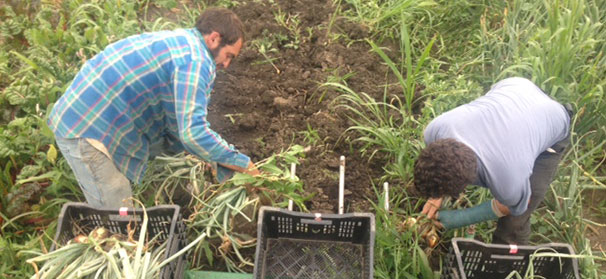

Dec 16, 2013Illinois organic growers expand to partnership site
An emerging organic farm operation just outside of Chicago is benefitting from a partnership between several organizations and a diligent husband-wife team that has capitalized on opportunities for growth.
Radical Root Farm will become the first certified organic farm in the history of Libertyville, Ill., operating at the centennial Casey Farm beginning in 2014. Farm owners Alex Needham and his wife Alison Parker are graduates of the Farm Business Development Center (FBDC), a program of the Liberty Prairie Foundation that supports the development of successful family farm businesses.
Radical Root’s transition to Casey Farm was made possible through a partnership between Conserve Lake County, the Lake County Forest Preserve District and the Liberty Prairie Foundation.
Radical Root Farm produces certified organic vegetables and free-range eggs, and its 110-member community supported agriculture (CSA) program serves customers in suburban Grayslake and Libertyville, as well as the Lakeview, Edgewater, Lincoln Park and Logan Square neighborhoods in Chicago. The farm will conduct its own farm stand sales, selling 40 different crops and up to 100 varieties. The growers also participate in Chicago’s Logan Square and Green City farmers’ markets.
Radical Root has been farming since 2009, and has participated in the FBDC at the Prairie Crossing Farm in Grayslake since 2010.
“The FBDC has helped us immensely with growing our business,” Needham said. “We could not be doing what we are doing if we had not had the great opportunity to join the FBDC, and we are incredibly grateful for the help we’ve received. We’re so excited to be able to graduate from this incubator program and move to Casey Farm. (We) are thrilled to continue to grow our business at a more permanent location.”
Parker said the couple had worked on some other farms leading up to their involvement in the Radical Root operation.
“We had worked on those other farms and wanted to be part of an organic, CSA farm by starting our own business,” she said. “Our issue was we are not from a farming family, and had no land in the family to work with. The only way we could get our business started was to rent land. We were lucky to be able to stay near Chicago through the business development center, (which) enabled us to rent the land and get help with the infrastructure and equipment.”
She said the arrangement is “pretty ideal for people who really have nothing to start with and no capital to start with right away – it allows you to grow your business.”
The couple had been on a path of doubling the size of their effort since 2009, but they were looking for a way to make the finances work.
“The issue with a lot of farmers here is it’s so expensive to buy land, it was virtually impossible in our situation. The opportunity we are in now is, basically, we are renting from the conservation organization and forest preserve with a long-term lease that enables us to live on the land. We were living in an apartment before. We know we will be here and feel like we’re in a stable, secure place. Before, we never even planted perennials.
“This is pretty ideal for us, given how impossible it is to buy land around Chicago,” Parker said. “If we did buy, we’d have to go two or three hours out. Here, we’re an hour from Chicago, our main market. We’re really excited that we got asked to do this.”
She and her husband have moved into the farmhouse with their two children. They haven’t grown on the land to this point, having concentrated on taking soil samples, drilling an irrigation well and constructing a greenhouse and cooler “in order to hit the ground running next season.”
The foundation is paying for the well installation and is splitting the costs with Radical Root for the postharvest wash/pack area.
The couple and their approximately eight employees will farm about 12 acres on site, with the possibility of leasing some surrounding private land.
“With the barn we are now renting, we can use the top level for a farm stand,” Parker said. “We’re in a populated area, so we’re thinking that would be a good source of income, hopefully. We’re trying to be a little more community based and not rely on Chicago so much.”
Radical Root hopes to help an area that used to be dotted by a number of productive vegetable farms return to that status.
“We’ve really become excited thinking there could be a movement here in Lake County,” she said. “It could be an alternative to people buying land and developing it. Instead, buy an old farm and regenerate it into a farm again.”














